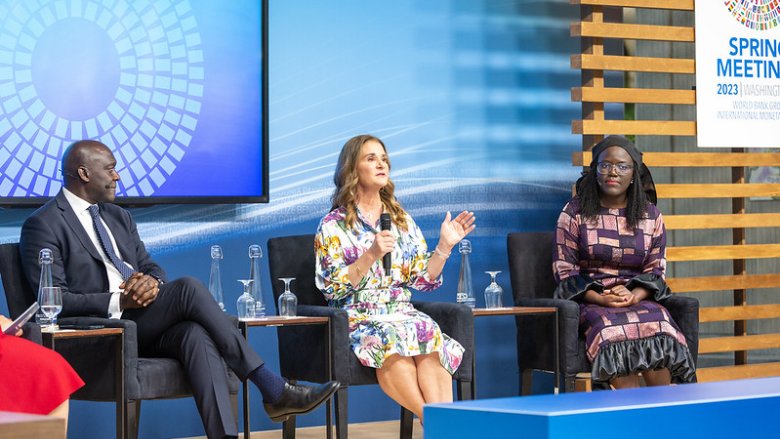The statement on the meetings issued by the Chair of the Development Committee, a ministerial-level forum that represents 189 member countries, commended the WBG for its response to the unanticipated series of crises and welcomed the “ambition and progress” in the Evolution process. The statement noted that achieving the goals of ending extreme poverty and promoting shared prosperity requires a strong focus on sustainability, resilience, and inclusiveness, and welcomed proposals to strengthen the WBG’s operational model and financial capacity to help achieve its mission.
Combating the climate crisis will be a priority in this work. T One event looked at how investing in human capital can help protect people from the worst effects of climate change and unlock their potential to drive the transition to a green economy.
With debt in developing countries at a 50-year high, the issue of debt sustainability was also never far from the spotlight during the week’s meetings. A meeting of the Global Sovereign Debt Roundtable focused on ways to speed the debt restructuring process and make it more efficient. The Roundtable agreed on the need to improve information sharing, including on macroeconomic projections and debt-sustainability assessments.
As slowing global growth and rising interest rates push more countries into debt crises, efforts to defuse the crisis have so far been insufficient. A Spring Meetings event on debt weighed issues ranging from the urgency of more debt transparency and faster workout agreements to the need for reforms that equip countries to manage debt more effectively.
“The treatment we need in terms of debt treatment is not complex. What we need is for the decision to come through quickly,” Ethiopia’s Minister of Finance Ahmed Shide said at the Spring Meetings event.
More than a year after the invasion of Ukraine, the war continues to cause immense human and economic suffering, regionally and globally. The repercussions were the subject of the third Ministerial Roundtable Discussion for Support to Ukraine, a session attended virtually by Volodymyr Zelensky, Ukraine’s President. The World Bank Group’s recent Rapid Damage and Needs Assessment estimated that the cost of recovery and reconstruction in Ukraine now tops $400 billion. Malpass, in a meeting with Ukraine’s Prime Minister Denys Shmyhal, discussed ways to leverage the report’s findings to build consensus around a long-term financing strategy, including the role of the private sector. The World Bank Group has mobilized more than $23 billion in support for Ukraine since the war began.
Throughout the week, both online and in-person audiences were also given the opportunity to engage with thought leaders, participate in interactive experiences, and provide insights during live discussions and across social media with the introduction of the Zone. A combination of digital programming and physical space, the Zone infused a diversity of expert voices to weigh in on some of the most pressing development challenges facing the global community today – from reshaping development, to maximizing financing to address these challenges. In person participants were also able to join their virtual counterparts in testing their knowledge with our Development Quiz, playing the role of project implementer with our Development Quest, and contributing their insights on Twitter, Facebook, Instagram and elsewhere across the social media landscape.
Other events during the Spring Meetings considered priority themes, including empowering women entrepreneurs and the importance of private capital in sustainable development. The session on gender stressed the importance of expanding access to finance for women-led businesses and recognizing the role women play in addressing global challenges. Speakers discussed the need for upskilling women, so they are not left behind amid rapid change in technology.
“Childcare is the number one thing keeping women out of the workforce,” said Melinda French Gates, Co-Chair of the Bill & Melinda Gates Foundation. “If there are safe, affordable places for parents to put their children, women enter the workforce.”
At the event on private capital, panelists discussed financial innovations to facilitate the mobilization of private finance and advisory work that can help maximize access to financing and mitigate risks. One example: innovative outcome bonds that use blended finance approaches to mobilize private capital to support sustainable development projects, such as the World Bank’s Wildlife Conservation Bond.
The statement from the Development Committee Chair, Mohamed bin Hadi Al Hussaini of the United Arab Emirates, paid tribute to Malpass, who is stepping down in June after four years at the helm of the WBG. The Development Committee thanked Malpass “for his strong and steadfast leadership of the WBG during a historically challenging period, including an unprecedented surge in financing in response to the multiple crises affecting global development outcomes.”

